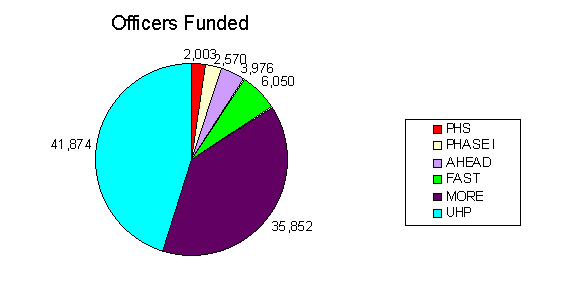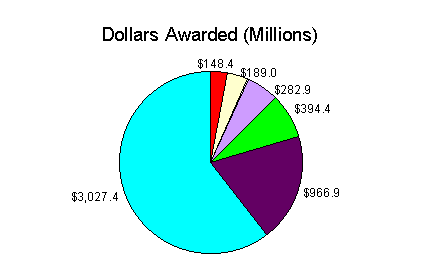

Background
In 1994, the President pledged to put 100,000 additional police officers on America's streets to promote community participation in the fight against crime. He subsequently signed the Violent Crime Control and Law Enforcement Act of 1994 (Crime Act), authorizing the Attorney General to implement over six years an $8.8 billion grant program for state and local law enforcement agencies to hire or redeploy 100,000 additional officers to perform community policing.
The Attorney General established the Office of Community Oriented Policing Services (COPS) to administer the grant programs and to advance community policing across the country. Management of the COPS grants entails both program and financial management. The COPS Office is responsible for: (1) developing and announcing grant programs, (2) receiving and reviewing applications, (3) deciding which grants to award, and (4) monitoring programmatic issues related to grants. OJP is responsible for financial management of the COPS program and is charged with: (1) reviewing pre-award and post-award financial activity, (2) reviewing and approving grant budgets, (3) providing financial management assistance after COPS has made an award, (4) disbursing federal funds to grantees, and (5) financial monitoring of COPS awards.
COPS and OJP established the following major hiring or redeployment grant programs to meet the President's goal. Hiring grants fund the hiring of additional police officers and generally last for three years. Redeployment grants are generally one-year grants and fund the costs of equipment, technology, and support resources (including civilian personnel) to free existing officers from administrative duties and redeploy them to the streets. At the end of the grant period, the state or local entity is expected to continue funding the new positions, or continue the redeployment of officers to community policing that resulted from grant funded equipment or technology purchases.
Grant requirements are contained in an "Owners Manual" for each type of COPS hiring and redeployment grant. The applicable manuals are provided to each grantee receiving a grant and are also posted on the COPS' internet site. We group COPS criteria into the following categories:
COPS grant funds must not be used to replace funds that eligible agencies otherwise would have devoted to future officer hiring. In other words, any hiring under the COPS program must be in addition to, and not in lieu of, previous hiring plans.
COPS guidelines require that grantees continue to hire as many new, locally-funded officers as it would have absent receipt of the grant. Grantees must also take positive and timely steps to fill any vacancies created on or after the grant award. Failure to hire the required number of officers is a potential indicator of supplanting. For example, the following practices would likely be regarded as supplanting:
(1) A department with vacant positions at the start of the grant period, or at any time thereafter, either hires no new officers other than COPS grant-funded hires or does not timely replace locally-funded vacancies created by attrition.
(2) Grant funds are used to replace, or to allow the reallocation of, funds already committed in a local budget for law enforcement purposes.
Grant recipients are required to complete and submit an Annual Department Report updating the information reported in the Initial Report. The Annual Department Report should demonstrate whether the grantees decreased the number of locally funded positions after receiving the COPS grants. By reviewing these reports, COPS can identify potential supplanting issues needing further study. In addition, recipients are required to submit a Hiring Officer Progress Report that solicits specific information pertaining to the officers hired under the COPS Hiring grants. Information gathered includes demographic information on the officers, duties and responsibilities of the officers, and dates of key events (such as date of hire, graduation from academy and when training began and concluded). Recipients of MORE redeployment grants must submit the MORE Annual Progress Report that requires the grantee to provide information about the increased levels of community policing that have resulted from the purchase of equipment and/or the hiring of civilian personnel funded under the COPS MORE grant program.
According to COPS, as of February 11, 1999, COPS and OJP had awarded approximately $5 billion in grants under the six major hiring and redeployment programs to fund more than 92,300 officers, of which about 50,139 officers had been hired and deployed to the streets. The following charts illustrate the officers funded and dollars awarded.


The COPS Office may have a continuing grant-making role beyond its goal of deploying 100,000 new officers by 2000. In his FY 2000 budget request, the President proposed a "21st Century Crime Bill" that includes $1.3 billion for Fiscal Year 2000 and $6.375 billion over the next five years "to help communities build on their successful efforts begun under the COPS program" by adding an additional 50,000 officers by 2005. The 21st Century Policing Initiative is intended to help communities hire, redeploy, and retain officers; give law enforcement access to the latest crime fighting technology; and engage the entire community in preventing and fighting crime.
Whether or not the 21st Century Policing Initiative is approved, a considerable amount of funds may be left over from the 1994 Crime Act authorization. Of the $8.8 billion authorized by the Crime Act, COPS estimated that $7.345 billion would be required to award grants to hire 97,920 officers for an average of $75,000 per officer. OJP's $150 million Police Hiring Supplement Program was to fund 2,080 officers toward the goal of 100,000 officers. As of February 1999, COPS and OJP had awarded approximately $5 billion in grants to hire or redeploy 92,324 officers at an average cost of $54,256 per officer. If the lower cost per officer trend continues, the total cost required to fund the 107,019 officers through FY 2000 would be approximately $5.8 billion. As such, almost $1.7 billion authorized under the Crime Act may not be needed, and could be used to help fund the 21st Century Community Policing Initiative if approved by Congress.
Prior Reports
The COPS program has been in existence since 1994. During this time, numerous audits and reviews have evaluated the program and have reported significant findings. Most of these audits and reviews were financial statement audits issued by the Office of the Inspector General (OIG). For the prior reports issued by the OIG, the report recommendations are resolved when the audited agency agrees to implement corrective actions. The recommendations are closed when the audited agency provides the OIG with documentation indicating that corrective actions have been implemented. All of the recommendations in the OIG's prior reports are either resolved or closed. Synopses of the significant findings and recommendations from the prior reports, and the status of corrective actions for the recommendations in the OIG reports, are contained in Appendix IV.
In April 1999, we issued a report summarizing the results of 149 audits of COPS grantees that we performed during fiscal years 1997-98 (See "Police Hiring and Redeployment Grants: Summary of Audit Findings and Recommendations, October 1996 - September 1998 (No. 99-14)).7 A response by the COPS Office and OJP to the OIG’s summary report was included as Appendix V. At the time the summary report was released, the OIG was in the final stage of completing this program audit of the COPS Office’s management of the $8.8 billion COPS grant program. Findings from the 149 individual grantee audits contributed to several of our findings and recommendations in this program audit.
The COPS Office strongly disagrees with our reliance on individual grantee audit reports and our interpretation of these findings in this program audit. Specifically, the COPS Office asserts that we misinterpreted and/or misapplied the COPS Office’s compliance standards in the areas of supplanting, retention, community policing, and redeployment. We dispute the COPS Office’s disagreements with our audit findings and this dispute is now the subject of an ongoing audit resolution process chaired by the Deputy Attorney General.
Consequently, we are releasing this program audit and note the COPS Office’s strong disagreement with many of the findings in individual grantee audits that contributed to findings in this program audit. The COPS Office’s response to this program audit can be found in Appendix V. The OIG’s analysis of COPS’ response can be found in Appendix VI. A further discussion of these disagreements also can be found in the previously cited Summary Audit Report and appendix.
Updates on the resolution process may be contained in the OIG’s semiannual report and the Attorney General’s Management response.
5 Use for overtime was allowable for the 1995 MORE grants and unallowable for subsequent MORE grants.
6 COPS retention requirements have evolved. According to COPS, the PHS and Phase I grants did not formally require retention. The COPS AHEAD, FAST, UHP, and all MORE grants required applicants to plan in "good-faith" for continuation of the program following the conclusion of federal support; however, the retention period was not specified. In our judgment, however, the intent of the overall program appears to be that all officer positions should be retained. In August 1998, COPS established a policy that grantees are only required to maintain the COPS funded officer positions for a minimum of "one budget cycle" after the budget cycle in which COPS funding ends (i.e., usually one year). COPS obtained approval for the policy from the Attorney General. Before obtaining approval from the Attorney General, COPS asked the OIG for comments on the proposed retention policy. We recommended that COPS require grantees to retain the positions for a minimum of three years, the term of the original hiring grants.
7 The results of the 149 audits appear in Appendix III. They are discussed throughout this report, but principally with respect to Finding III. We continue to perform additional grant audits as our resources permit.
#####